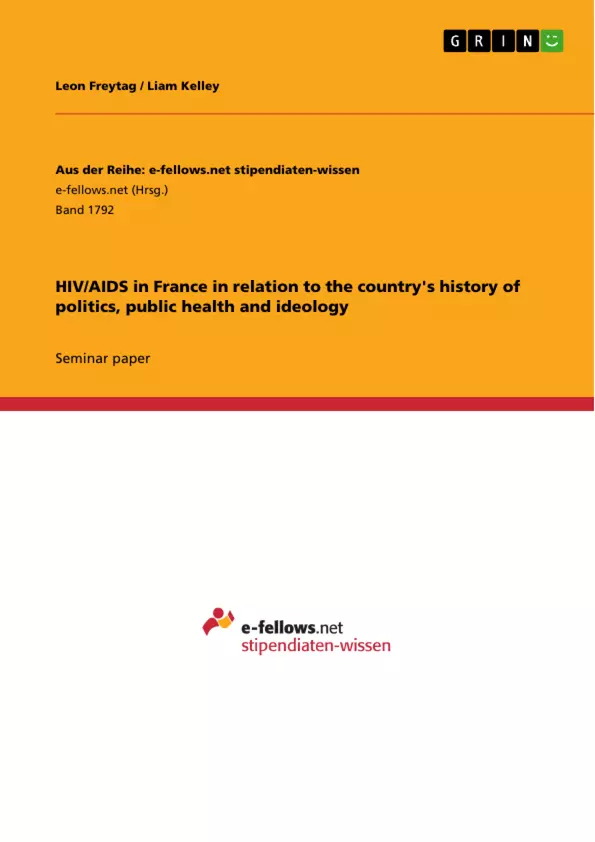This essay will provide a basis for a thick description of the AIDS issue in France. We describe the history of politics surrounding AIDS, the conception of Public Health in France, French ideologies and the relationship to stigma and language. All of these are of particular salience when addressing an issue like AIDS, which is a non-linear issue in that it cannot be attributed to any one cause.
France has the highest number of HIV-positives in all Europe. The number of people living with HIV/AIDS in France has steadily increased in the last decade from 120,000 in 2005 to about 150.000 in 2015 (indexmundi, 2015). Its prevalence rate, 0.4%, is also relatively high compared to the rest of Europe, e.g. 0.2% in the UK and 0.1% in Germany. Every year between 1500-2000 people die of HIV/AIDS in France (Ibid). This is only about 1% of the total number of HIV-positives, showing that France does reasonably well in providing ART (anti-retroviral treatment). Rather they have been facing difficulties regarding prevention. The rate of newly diagnosed HIV infections has been decreasing, but only slowly, from 9.5 per 100 000 in 2005 to 6.3 per 100 000 in 2011 (WHO, 2011). It is striking that more than a third of seropositives remain undiagnosed in France (Supervie et al., 2014).
Inhaltsverzeichnis (Table of Contents)
- INTRODUCTION
- HIV/AIDS IN FRANCE TODAY
- IDEOLOGY
- POLITICS SURROUNDING PUBLIC HEALTH
- MEASURES AGAINST HIV
- THE MAGIC BULLET APPROACH
- CONDOM USE
- SCREENING
- CULTURE & LANGUAGE
- STIGMATIZATION
- MSM AND HIV/AIDS
- IMMIGRATION AND HIV/AIDS
- RECOMMENDATIONS
Zielsetzung und Themenschwerpunkte (Objectives and Key Themes)
This essay presents a comprehensive analysis of the AIDS epidemic in France. It explores the historical context, political landscape, social ideologies, cultural influences, and language used to describe HIV/AIDS, highlighting how these factors contribute to the ongoing epidemic.
- The historical and political context of the AIDS epidemic in France.
- The role of public health policies and ideologies in shaping responses to AIDS.
- The influence of cultural factors, including language and stigma, on the perception and experience of HIV/AIDS.
- The specific challenges faced by MSM and immigrants in relation to HIV/AIDS.
- Recommendations for improving prevention and care strategies in France.
Zusammenfassung der Kapitel (Chapter Summaries)
The essay begins by introducing the current state of the AIDS epidemic in France, highlighting its high prevalence rate and the challenges related to prevention. It then delves into the historical and political context of AIDS in France, tracing the development of public health policies and the role of political ideologies, including Republican Egalitarianism and its relationship to stigma and the concept of “dégénérescence”.
The following section examines the various measures implemented to combat HIV, including the “magic bullet” approach to research, condom use promotion, and HIV screening practices. The essay also explores the role of culture and language in shaping the perception of AIDS, analyzing the use of the French words “SIDA” and “le sida”.
The final chapters focus on the specific challenges faced by MSM and immigrants, exploring how stigma, cultural beliefs, and political policies contribute to their vulnerability to HIV/AIDS.
Schlüsselwörter (Keywords)
The essay focuses on the interplay of political ideologies, public health policies, cultural factors, and social stigma in the context of the AIDS epidemic in France. Key terms and concepts include Republican Egalitarianism, “dégénérescence”, “le sida”, MSM, immigration, and the "magic bullet" approach to research.
Frequently Asked Questions
What is the situation of HIV/AIDS in France compared to Europe?
France has the highest number of HIV-positive people in Europe, with a prevalence rate of 0.4%, which is higher than in the UK (0.2%) or Germany (0.1%).
What is "Republican Egalitarianism" and how does it affect AIDS policy?
It is a French ideology that treats all citizens as equal individuals, which can sometimes hinder targeted prevention efforts for specific vulnerable groups.
Why is HIV screening a challenge in France?
Strikingly, more than a third of seropositive individuals in France remain undiagnosed, showing significant difficulties in effective screening and prevention.
How is language related to the stigma of AIDS in France?
The essay analyzes the use of terms like "SIDA" and "le sida" and how French culture and language shape the experience and experience of the disease.
What specific groups are most affected by HIV in France?
The essay focuses on Men who have Sex with Men (MSM) and immigrant populations, exploring how political policies and social stigma contribute to their vulnerability.
- Quote paper
- Leon Freytag (Author), Liam Kelley (Author), 2016, HIV/AIDS in France in relation to the country's history of politics, public health and ideology, Munich, GRIN Verlag, https://www.grin.com/document/322227



